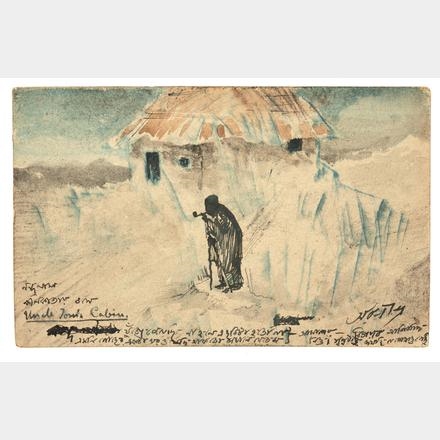
In a sense, Brahmos, like Tagore, might unconsciously have thought of Harriet Stowe as a Unitarian, 'Boston Brahmin' type, incarnation of our Rg Vedic, female, Rishi Vagambhrini- Vak, speech, the Goddess who is the matrix of everything Divine- who was doing something analogous to Raja Ram Mohan Roy in that her work united Evangelical Christianity to a Utilitarian mission of Social Reform.
The painting above, by Tagore's nephew Abanindranath, captures a quality of virile endurance in durance vile which we may describe as the incipient Shakti- the perhaps not yet Vocalizable, yet potentially empowering and always fertile Power- of Swami Vivekananda's Daridra Narayan- God in the form of the oppressed and abject. Uncle Tom, back bent but pipe erect and billowing smoke, represents the Feminine strength to survive and continue to serve though himself of that abject class which, in its male 'Sadhu' form, exists to be but served by the Religion of Unionist National Reconstruction.
Interestingly, in the one surviving fragment we have of Mahakavi Tagore's play 'Toma Kakar Kutir', we see a very different conception of Uncle Tom. Did Tagore have access to Josiah Henson's account of his life as a slave? Does Tagore's de-sentimentalization of that stock figure arise out of factual knowledge of its original? There is no evidence such was the case. On the other hand, it should be borne in mind, Tagore himself, for many years, managed his family's vast estates. He had personal experience of the sufferings of the bonded laborers whose material existence was more wretched by far than the norm in the slave quarters of the Cotton plantations of Nineteenth Century America.
With remarkable literary economy, the soon to be Dr. Protiba Sen, currently a PhD candidate at Tufts, has syncopated all such themes, with great precision and compression, in her equally irreal translation of this imaginary fragment from our National Poet
Eva; Topsy, will you take and ever keep with you this lock of my golden hair? Darkness calls to me. I shall not see the Dawn. Stay thou in the Light. Open your heart to Christ. We will find each other in Heaven's plantation where all work yet all are free.
Uncle Tom; Hush now, Miss Evangeline. Your father has gone to fetch Dr. Campbell. He is a brilliant young man. And so handsome.
Topsy; Will Miss Eva die?
Uncle Tom; Topsy, all must die. Though the night is long and storm beset yet the bridegroom draws nigh.
Eva: Uncle Tom, will you look after Topsy? Will you lead her to Christ? I give you this lock of my hair.
Uncle Tom: This is pussy hair
Eva; What did you expect? We own a lot of slaves. I need to keep enough hair on my scalp to look good in the coffin.
Uncle Tom; The storm abates. The bridegroom hesitates. You have a bald spot on your pussy. The groom will think you have alopecia of the minge- a characteristic of secondary stage Syphilis.
Eva; Fuck he'll care. I go ass to mouth straight off the bat. The last thing he'll be thinking about is my bush.
Uncle Tom; Then die strumpet! With these black hands I strangle thee! The Massa's escutcheon must ever remain as unstained as the white cotton we pluck. 'Tis better if this jade's death is laid at the door of a demented slave than that she should live to marry an honourable man, yet lack maidenhood. I gladly forfeit my life to draw a veil over the family's disgrace.
Topsy; Miss Eva was just joshing. And she wasn't really ill. We just thought it would be funny to stick you with some pussy hair. Actually it is your wife's pubes which she dyed blonde. It was all a ploy to get you to recall the magic of her minge.
Uncle Tom: The moral of this story is Black Wives Matter
Topsy : All Lives matter. Speaking of which, we'd better scarper sharpish.
No comments:
Post a Comment